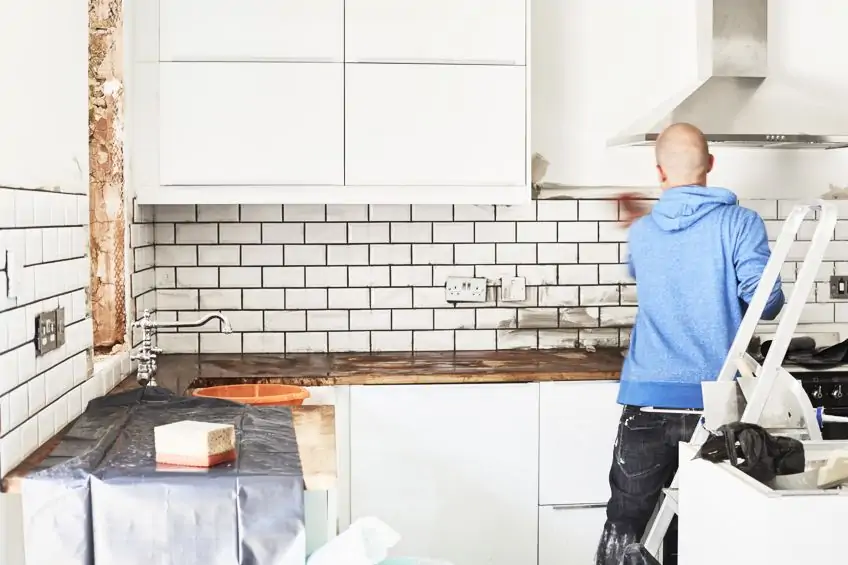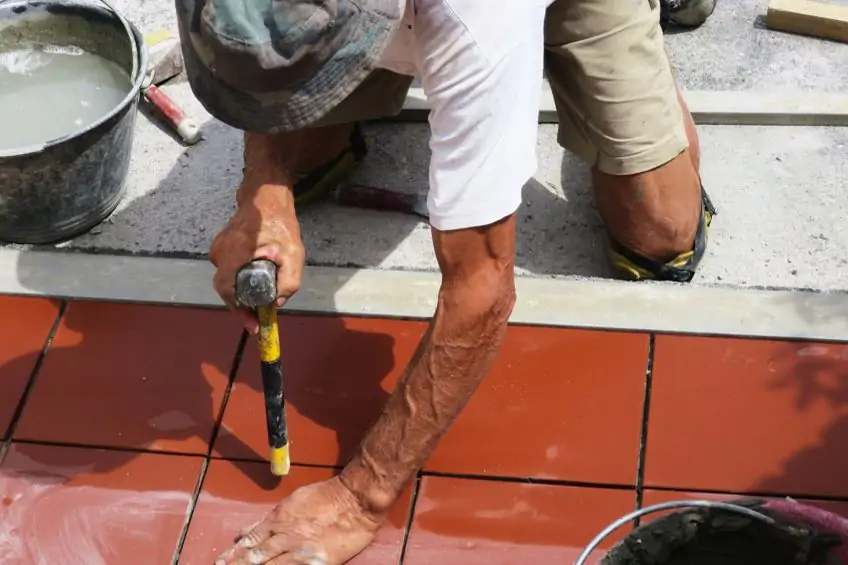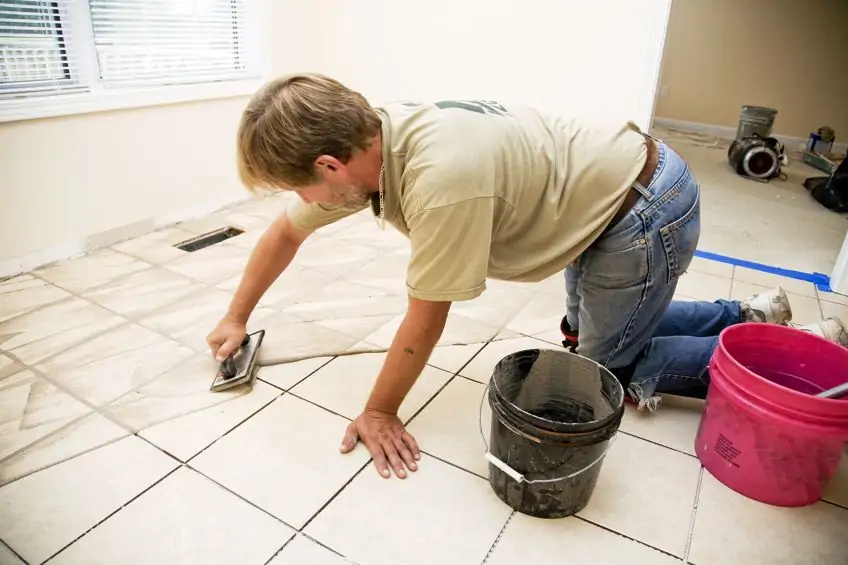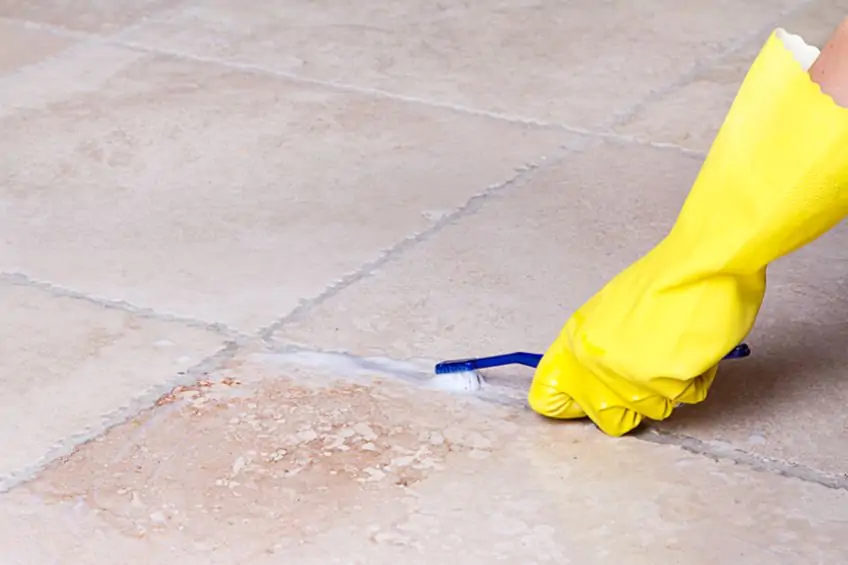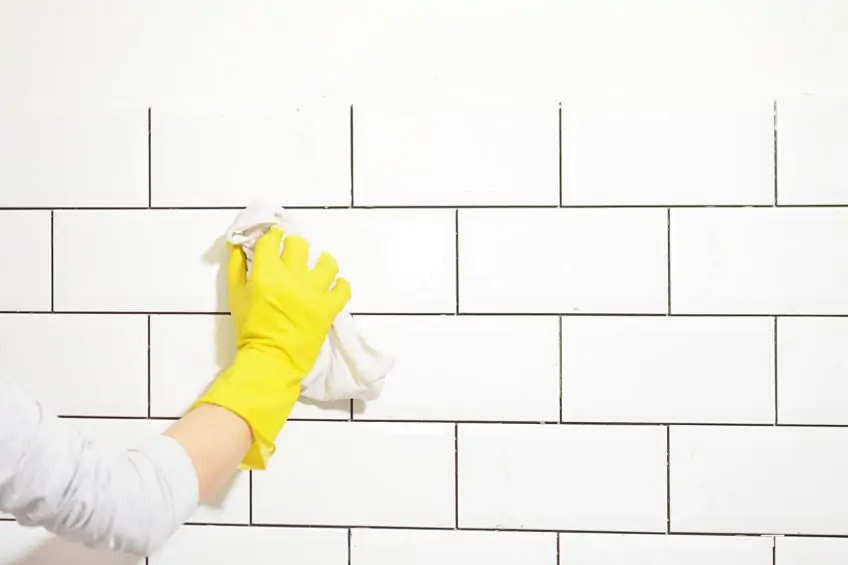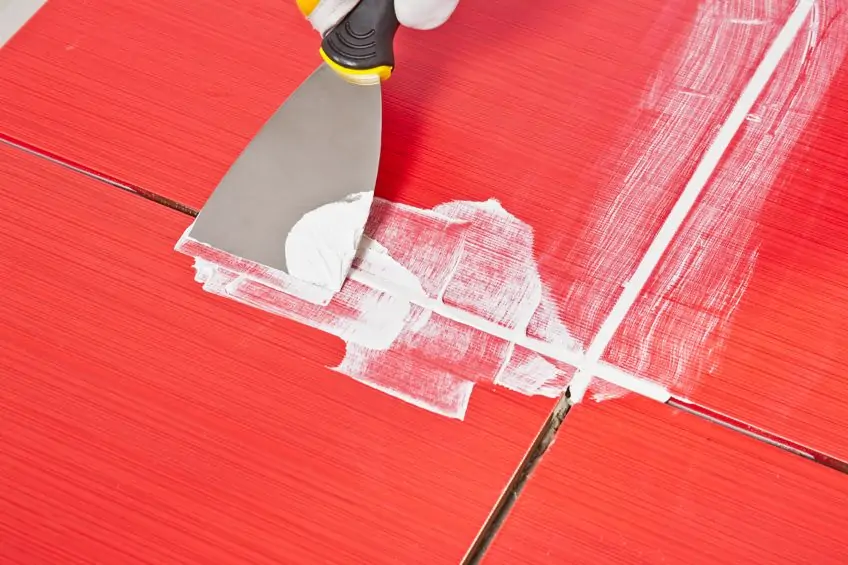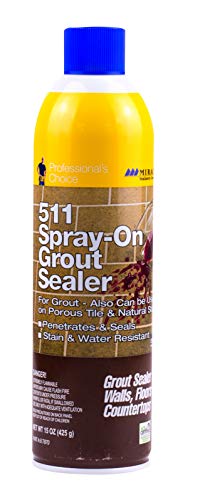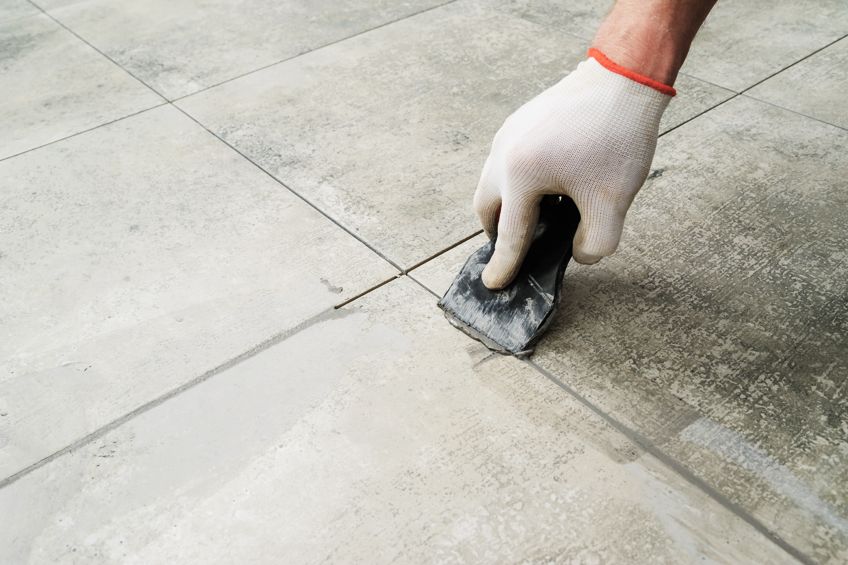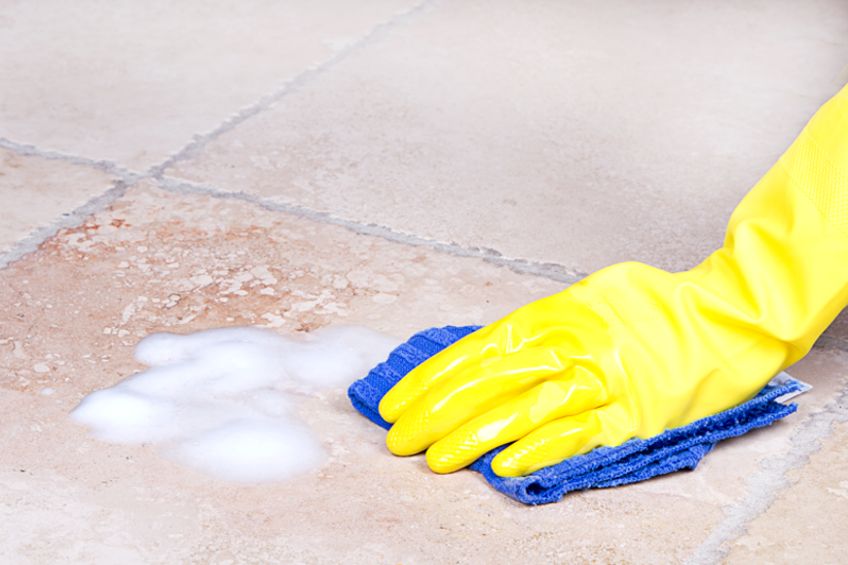Best Grout Sealer – Our Recommendations for the Top Grout Sealant
This post may contain affiliate links. We may earn a small commission from purchases made through them, at no additional cost to you. You help to support resin-expert.com
Sealing your tile grout is essential and it is an easy DIY project, however with the abundance of different products on the market, you may be wondering what grout sealer to buy. The ideal grout sealer depends on your budget, the location of the grout as well as your specific needs. This article will cover the topic in full and help you to decide what grout sealer is best for you as well as provide an overview of the grout sealing process. Read on to find out more.
Table of Contents
What is Grout Sealer and Why is it Necessary?
Let us start with grout. Tile grout is a powder containing cement and limestone. Sometimes it may contain a pigment or sand. It is mixed with water to create a paste that is used to fill the spaces between newly installed tiles. Once it has dried, grout prevents dust and dirt from collecting in between the tiles and it also prevents excess moisture from getting underneath the tiling. However, grout can be porous which will absorb water which can lead to mold or mildew growth, and in the worst-case scenario, it can lead to structural failure.
Choosing to apply a quality grout sealer can prevent the grout from soaking up moisture and thus increase the longevity of your tiling as well as keep it clean and free from stains and mold growth. Mold growth on tile grout can become hazardous to human health if it is neglected and allowed to flourish. It is advised to remove the mold before it becomes a problem. An important part of sealing old grout is cleaning. This article will also cover some of the methods for cleaning your grout effectively.
It is important to note that unsanded epoxy-based grout does not require sealant as it is by nature non-porous and thus waterproof and easier to clean than sanded grout. It is also extremely durable. Epoxy-based grout may have its advantages but it can be expensive and it tends to look artificial.
Types of Grout Sealer
With the seemingly endless amount of companies that manufacture grout sealers, it comes as no surprise that there are a lot of different formulations to choose from. There are water-based varieties as well as solvent-based ones but there are two main types of grout sealers that are worth noting first. These are membrane-forming grout sealers and penetrating grout sealers.
Membrane-forming Grout Sealer
Membrane-forming, sometimes called surface coating grout sealer is ideal for areas that require moderate protection like a kitchen sink splashback or floor tiles. However, surface coating grout sealers are less ideal for areas that are exposed to excessive moisture and steam such as bathrooms. It would be best to apply a penetrating sealer to these areas. The downside of membrane-forming grout sealer is that it can go cloudy after time and requires reapplication more often than penetrating sealer.
Penetrating Grout Sealer
Penetrating or impregnating grout sealer is ideal for maximum protection against excessive moisture. Penetrating grout sealer is true to its name, in that it penetrates the surface of the grout, unlike surface coating sealer. This type of sealer is not only more effective but also lasts longer as it only needs to be reapplied every three to four years. There are some penetrating grout sealers on the market that can add a color tint to your grout. This is a great way to protect your tiling as well as cover up existing stains or increase aesthetic appeal.
Water-based and Solvent-based Grout Sealers
When we talk about water-based and solvent-based we are referring to the carrier of the actual grout sealer. The carrier, be it water or solvent, will evaporate as the grout sealer dries, this in effect, will seal the grout. Generally speaking, solvent-based grout sealers can penetrate much deeper into surfaces than water-based grout sealers. However, with the scientific development of various formulations, most water-based sealers penetrate deep enough as grout tends to be very porous as it is.
The upside of using water-based grout sealers is that they are generally lower in VOCs. VOC stands for volatile organic compounds. Solvent-based grout sealers contain more of these compounds which are bad for the environment as well as human health. This being said it is advised that you opt for a water-based sealer but if you are going to use a solvent-based sealer be sure to use protective gloves and a respirator. It is also wise to make sure that the room you are working in has some windows and doors open to increase ventilation.
How to Clean Old Grout
Sealing grout is one thing but what if you have neglected the chore for too long and you are now dealing with dirty, stained, molded, or bacteria-infested tile grout? Applying grout sealer over old dirty grout may lock in the dirt or prevent proper adhesion of the sealer. It goes without saying, it is best to clean old grout before applying grout sealer.
Read on to find out more about the different methods for cleaning grout effectively.
Scrub with Hot Water
It is best to start with some hot water. Hot water can help loosen some of the surface grime, thus making it easy to remove. Spray the grout lines with hot water and then use a scourer or a toothbrush to scrub the grout before rinsing the area and moving onto the next method if necessary. Using a steam cleaner is a more effective alternative to this method.
Bicarbonate of Soda and Vinegar
Mix bicarbonate of soda with water to create a paste. Use a toothbrush to scrub the grout with the mixture and leave it to sit for a few minutes. Next, using a spray bottle, spray distilled white vinegar onto the bicarbonate of soda. It will start to fizz and bubble as a chemical reaction takes place. Continue scrubbing the grout with a toothbrush or scourer to remove the dirt and grime. It is wise to thoroughly rinse white vinegar from tile grout as it can be corrosive over time.
Oxygen Bleach
If you are battling tough stains on your grout you can try some oxygen bleach, also called sodium percarbonate. This product is not as toxic as household chlorine bleach but it is still wise to use it with caution. Before using oxygen bleach, it is best to read the manufacturer’s instructions. Be sure to use it in a well-ventilated space. You will need to leave the formula on the grout for about 15 minutes before rinsing it with clean water.
Bicarbonate of Soda and Hydrogen Peroxide
Another concoction that can be very effective in removing dirt from gout is bicarbonate of Soda and hydrogen peroxide. Mix the two, one-part hydrogen peroxide to two parts bicarbonate of soda to create a paste. Add a dash of dish soap to help fight oils and grease. Apply this paste to the grout lines and let it sit for about 15 minutes before scrubbing with a toothbrush or a scourer and finally rinsing thoroughly with water.
This combination of ingredients should restore your old grout lines to their former glory.
Our Recommendations for the Best Grout Cleaners
As mentioned earlier, cleaning your old tile grout is an essential step that should be done before you begin sealing your grout. Lucky for us, there are products available that are specifically formulated for cleaning tile grout. These products are usually sold premixed which is super convenient. Some of them may be a bit more expensive than the methods mentioned above but some of them are extremely effective and will save you some time and effort. Read on to find out about our favorite grout cleaners.
Best Grout Cleaner for Mold: RMR-86 Instant Mold and Mildew Stain Remover
Mold can be very difficult to remove from grout. Even when you think you have removed the mold you may find that the mold has left behind a stubborn stain. RMR-86 Instant Mold and Mildew stain remover is a fast-acting mold and mildew remover that works on a variety of different surfaces including grout. Its penetrating formula works on porous surfaces and is effective on even the toughest mold and mildew stains. The application is simple and the formula begins to work in less than 15 seconds without the need to scrub.
- Instant cleaner removes the stains from black mold and mildew
- The spray is suitable for the kitchen, toilet, drywall, and vinyl
- Spray the ready-to-use formula on the affected area and wipe down
PROS
- Fast-acting
- Ideal for mold and mildew
- Safe use on multiple surfaces
- Removes unwanted odors
- Ready-mixed
CONS
- Does not inhibit mold regrowth
- Not ideal for big mold problems
Safest Grout Cleaner: REJUVENATE Grout Deep Cleaner
You may be concerned about using strong chemicals around pets or children. This concern is warranted as there are a lot of products out there that contain harsh chemicals. Rejuvenate Grout Deep Clean is one of the safest products on the market and it is also an effective grout cleaner, even against the toughest dirt and grime. Its bio-enzymatic formula continues to clean long after you have used it. Best of all, it is non-toxic, meaning it is safe to use around kids and pets. Make the best choice for you and your family and opt for Rejuvenate Grout Deep Cleaner.
- Grout stain lifter removes dirt and grime from old grout stains
- The bio-enzymatic spray continues cleaning grout and tile after use
- Restores the original color of shower, bathroom, and floor grout
PROS
- Non-toxic
- Effective bio-enzymatic formulation
- Safe to use on a variety of surfaces
- Click n Clean Grout brush Compatible
- Deep cleaning
CONS
- Does not seal grout
- Might not be as effective as strong chemicals
Best Overall Grout Cleaner: BLACK DIAMOND Ultimate Grout Cleaner
Black Diamond Ultimate Grout Cleaner is a great all-rounder. Its penetrating formula is effective in soaking into the grout and lifting dirt, grease, and grime. The built-in spray nozzle makes for easy application. This acid-free product is affordable and effective on food stains, dirt, and soap scum. It will clean colored grout without bleaching the color and is safe to use on multiple surfaces. Black Diamond Grout Cleaner will not work on mold, calcium buildup, or water spots but it is ideal for basic and regular grout cleaning.
- Acid-free and safe deep cleaner and stain remover for tile grout
- Suitable for cleaning grease, food spills, soap scum, and dirt
- This cleaner is suitable for grout that is white or colored
PROS
- Non-acidic
- Easy to use
- Fast-acting
- Safe for ceramic and marble tiling
- Effective on tough dirt
CONS
- Not ideal for removing mold
- Will not whiten old yellowing grout
Now that your grout lines are sparkling and free from dirt and grease, it is time to choose a grout sealer. Before you begin applying the grout sealer it is important to wait for the grout to be completely dry. If you apply grout sealer to wet grout, the sealer may not adhere properly to the grout which will cause the sealer to fail, and over time you will have moisture seeping as well as stains forming.
Our Top Recommendations for the Best Grout Sealants
You may be finding it difficult to choose from the plethora of available options. Your choice of grout sealer will depend on the surface you are dealing with as well as your specific preferences. What follows is an introduction to our top grout sealer picks. These grout sealers are the most recommended and highly rated. Each one mentioned has its specific advantages. Read on to narrow your search for the best grout sealer.
Best Deep-Penetrating Grout Sealer: MIRACLE SEALANTS Impregnator Sealer
Miracle Sealants Impregnator grout sealer is solvent-based, thus it can penetrate deeper than most water-based sealers which mean longer-lasting production from moisture. Not only does this sealer seal grout effectively but it also seals natural stone, slate, and quartz. This sealer’s formulation is oil-resistant as well as water-resistant which forms an invisible protective barrier that lasts up to 20 years. This grout sealer offers excellent coverage and stands up against the elements. It is easy to use and does not alter the appearance of the surface.
- For use on a variety of surfaces, including grout, tile, and ceramic
- The formula is oil and water-resistant offering superior coverage
- Easy application and will not yellow, safe to use for food prep areas
PROS
- Penetrates grout deeply
- Can be used on a variety of surfaces
- Offers excellent protection
- Long-lasting
- Great coverage
CONS
- Solvent-based
- Bad odor
Best Eco-friendly Grout Sealer: AFM SAFECOAT Grout Sealer
This low-odor, easy-to-use sealer is also one of the safest grout sealers available. AFM Safecoat is ideal for kitchen and bathrooms as it offers excellent water resistance and can last up to five years. This sealer also contains no VOCs or formaldehyde. AFM Safecoat will be ready for a second coat in four hours and cures completely in 24 hours. One quart can cover up to 100 sq. ft. of normal grout lines and does not discolor the grout, instead, it dries clear.
- Good water resistance for up to five years when properly applied
- Low odor is non-offensive to installer and occupant
- Safe for use and contains no formaldehyde or other toxic chemicals
PROS
- Environmentally-friendly
- Low odor
- Great coverage
- Long-lasting (if applied properly)
- Does not affect the color of the grout
CONS
- Moderate penetration
- Expensive
Best Premium Grout Sealer: AQUA MIX Sealer’s Choice Gold
Aqua Mix Sealer’s Choice Gold is extremely versatile. It can be used on granite, marble, slate, limestone, porous tile as well as grout. It is easily applied with a sponge and when it is cured it is mold and mildew resistant. This sealer is a premium choice and boasts a natural, no-sheen look and penetrates deep into the grout which protects from moisture and stains. It is also safe to use in areas of the home where food is prepared and it claims to offer protection for up to 15 years. Aqua Mix Sealers Choice Gold is ideal for interior and exterior surfaces alike.
- Aqua Mix sealer is a no-sheen, natural look, penetrating sealer
- Ideal for granite, limestone, marble, slate, travertine, and porcelain
- Provides stain protection and maintains the look of natural stone
PROS
- No-slip
- Natural look
- Safe for food prep areas
- Versatile
- Easy application
CONS
- Can be expensive
Best Grout Sealer for Big Jobs: TUFF DUCK Natural Grout & Stone Sealer
Tuff Duck Granite, Grout & Stone Sealer offers maximum protection for slate, marble, travertine, and even concrete. This non-acidic formula comes in a one-gallon bottle which is ideal for large surface areas as it can cover up to 800 sq. ft. This penetrating sealer will not alter the appearance of your grout line or other surfaces. Tuff Duck is effective in resisting oils as well as water. It offers protection for up to five years for interiors and three years for exteriors. If you are getting ready to tackle large surface areas, this is the sealer for you.
- Suitable for granite, grout, marble, travertine, limestone, or slate
- The penetrating sealer will not affect the natural appearance of tiles
- The non-acidic formula provides coverage for up to 800 square feet
PROS
- Suitable for a variety of surfaces
- Effective sealant
- Ideal for large surface areas
- Long-lasting
- Easy application
CONS
- Strong smelling
Best Spray-on Grout Sealer: MIRACLE SEALANTS Spray-on Grout Sealer
Applying grout sealer can be a tedious task. Spray-on sealers are super convenient but are they effective? Miracle Sealants Spray-on Grout Sealer, as the name suggests is a spray-on sealer that comes in a handy aerosol can that is very easy to use as it does not require the use of applicators. One can seal grout straight from the can. The pressurized aerosol tin provides even coverage and best of all, it is an effective grout sealer that protects your grout from moisture and stains not to mention, it is quick-drying!
- Suitable for use inside or outside on a range of surfaces
- The formula provides maximum stain protection of cementitious grout
- UV transparent, will not yellow, and resists weather elements
PROS
- Super easy to use
- Quick-drying
- Effective grout sealer
- Non-yellowing
CONS
- Not ideal for surfaces other than grout
- Can stain other surfaces
How to Apply Grout Sealer
Applying grout sealer is a simple enough DIY task even for the most novice DIYer. It may very well be a tedious exercise, especially if you are working on a large surface area. For best results, take your time, work methodically and be patient. What follows is an overview tutorial of the process of applying grout sealer to the grout.
It is wise to refer to the instructions that are supplied with your chosen grout sealer.
What you Will Need
In order to safely and cleanly apply your grout sealer, you need some supplies. Here is a brief list of the most essential tools for applying grout:
- Grout sealer
- Nitrile gloves
- Soft lint-free cloth
- Applicator (Brush, foam roller, or applicator bottle)
- Grout cleaning solution (unless you are sealing new grout)
Clean and Repair Grout
Cleaning the grout before applying the grout sealer is essential. As we touched on earlier, applying grout sealer to dirty grout will seal in the dirt and grime and make it difficult to remove after the fact. Grease and grime can also affect the adhesion of the sealer. There are several ways to clean grout. The methods mentioned above are some of the most effective. This is an important part of the process and should not be skipped unless you are dealing with new grout.
If your grout is chipped and cracked it is a good idea to carry out the repairs before applying the grout sealer. This can be done by removing the damaged grout and applying new grout. If you are dealing with freshly installed tiles it is best to wait about 72 hours for the grout to dry completely.
Choose your Sealer and Applicator
Choosing the right grout sealer will depend on which tiled area of your home that you will be addressing as well as the types of tiles such as marble, stone or ceramic tiles. In some cases, such as unsealed tiles with thin grout lines, you may be able to sponge the sealer over the entire area. In most cases, you will be better off using a small applicator brush or sponge. Some products even come with an applicator wheel built into the bottle.
The grout sealer should have all the information you need on the label, such as which areas of your home it is formulated for, as well as whether or not it is ideal for glazed or unglazed tiles. Always refer to these parameters and the instructions provided before purchasing a grout sealer.
Applying the Grout Sealer
After donning your nitrile gloves, douse your chosen applicator with the sealer and apply the grout sealer slowly and methodically to the grout lines. You may have chosen a rolling applicator bottle or a spray bottle. This should make the job a tad easier. Make sure to soak the grout liberally to ensure total coverage, wiping away any excess sealer with a lint-free cloth. It may be a good idea to start with the vertical grout lines and then move on to the horizontal lines. This may make it easier to not miss any areas.
Be sure to cover the grout edge to edge. Unless you are using a grout sealer designed for grout and tiles, keep a rag handy to wipe away the grout sealer that gets onto the tiles before it dries.
The drying time of the grout sealer will vary from manufacturer to manufacturer but this usually ranges from 15 to 60 minutes. You will most likely need to apply another coat of grout sealer and a third coat may also be necessary. Some grout sealers will take 24 hours to cure and others may take up to 48 hours. It is best to wait for the sealer to cure before you resume normal use of the surface.
Professional Tips and Tricks for Cleaning and Applying Grout Sealant
Hiring a professional to clean and re-apply your grout is not necessary. You can easily complete this process yourself, and we have some great tips to make your life easier.
- To make the task of cleaning tile grout easier, you can use an electric toothbrush and some whitening toothpaste. Surprisingly, this can be quite effective not to mention it’s faster and less taxing on the elbow. There’s nothing like minty fresh grout lines.
- For stubborn grime on your tile grout, it is best to use a stiff bristle grout brush. As the name suggests, these brushes are specifically designed for getting tough dirt out of grout lines. This may be the ideal tool but you will still need to apply some elbow grease.
- To seal off areas that you do not want to put grout sealer on, use painter’s tape.
- To prevent excess grout sealer from drying onto the tiles, keep a cloth handy when sealing the grout unless of course, you are sealing unglazed tiles. If you are sealing unglazed tiles, make sure you have selected a sealer that can be used on both tile and grout.
- A great way to check if you have sealed the grout sufficiently is to sprinkle a couple of drops of water onto the grout. If the drops soak into the grout it has not been sealed properly. The water droplets should remain on the surface of the grout and will not be absorbed. Be sure to try this trick when you are sure the sealer has dried.
- If you are sealing grout in between floor tiles, it is wise to begin at the end furthest from the door and work your way from one side to the other applying the grout sealer systematically until you reach the exit.
- To avoid buying too much or too little grout sealer, assess your surface area and consult the manufacturer’s instructions for your chosen grout sealer. There should be information pertaining to how many sq. ft. of grout the container will cover.
Conclusion
Although it may be a bit tedious, sealing tile grout yourself is a super easy DIY task that will keep your tiling looking fresh for years to come, as long as it is done correctly. choose your sealer wisely by referring to the label or speaking to an expert. Make sure your old grout is cleaned thoroughly before applying the sealer. If your grout is new, allow it to cure before sealing it. Be patient, take your time and follow these simple steps. Before you know it you will have successfully sealed your grout and will be off the hook for a good few years.
After reading this article, you should know everything necessary to research, buy, and use the best grout sealer. From cleaning your old grout to re-grouting, you do not need to hire a professional. You can take pride in your home and the ease with which you can maintain it.
Frequently asked Questions
Does New Grout Need to be Sealed?
New grout is often left unsealed as contractors will usually complete the tile installation and leave it as it needs to cure before the grout sealer is applied. This is something you may have to do yourself unless you specifically request your contractor to apply grout sealer once the new grout has cured completely.
How Soon Can I Seal New Grout?
Sealing new grout is essential for protecting it from stains and moisture but it is best to wait at least 48 hours before you apply a grout sealer to your newly installed grout. To be safe it is recommended that you wait up to 72 hours before applying the sealer. A general rule is that grout needs to be clean and dry before applying grout sealer.
Do all Grout Types Need to be Sealed?
While it is important to seal cement-based grout to protect it from moisture, stains, and mold, synthetic grout like urethane and epoxy do not require regular sealing. These types of grout are not porous like cement-based porous, thus they naturally repel moisture and are easy to clean.
How Long Does Grout Sealer Take to Dry?
The drying and curing time of grout sealers will vary from one manufacturer to another. Generally speaking, grout sealer will dry in about two to three hours but can take up to 48 hours to cure completely. It is best to wait until it is properly cured before resuming normal use.
Do Tiles Need to be Sealed?
If your tile is porcelain or glazed ceramic your tiles will not need to be sealed. However, unglazed tiles such as natural stone or terracotta will need to be sealed. You may require a different type of sealer for sealing unglazed tiles but there are multiple dual-purpose grout and stone sealers available today that are effective. It is important to note that grout sealer can stain unglazed tiles and it can be difficult to remove after the fact.
How Often Should I Apply Grout Sealer?
While Manufacturers of grout sealers may have some bold claims regarding how long their grout sealers last it is important to note that high traffic and regular cleaning will eventually wear down the grout sealer. It is advised to seal grout annually or bi-annually for areas with higher traffic. At a stretch, you may be able to get away with sealing your grout every other year.
How Many Coats of Grout Sealer Should I Apply?
Applying a single coat of grout sealer may not do the trick especially if your grout is very porous. Applying two or more coats of grout sealer is recommended. Be sure to allow the sealer to dry before applying the second and third coats. Refer to the manufacturer’s instructions to be certain of the drying times as well as the suggested number of coats.


